
Godzilla is a fictional monster, or kaiju, that debuted in the eponymous 1954 film, directed and cowritten by Ishirō Honda. The character has since become an international pop culture icon, appearing in various media: 33 Japanese films produced by Toho Co., Ltd., five American films, and numerous video games, novels, comic books, and television shows. Godzilla has been dubbed the King of the Monsters, an epithet first used in Godzilla, King of the Monsters! (1956), the American localization of the 1954 film.

Kaiju is a Japanese term that is commonly associated with media involving giant monsters. A subgenre of science fiction, it was created by Eiji Tsuburaya and Ishirō Honda. The term can also refer to the giant monsters themselves, which are usually depicted attacking major cities and battling either the military or other monsters.

Rodan is a fictional monster, or kaiju, which first appeared as the title character in Ishirō Honda's 1956 film Rodan, produced and distributed by Toho. Following its debut standalone appearance, Rodan went on to be featured in numerous entries in the Godzilla franchise, including Ghidorah, the Three-Headed Monster, Invasion of Astro-Monster, Destroy All Monsters, Godzilla vs. Mechagodzilla II and Godzilla: Final Wars, as well as in the Legendary Pictures-produced film Godzilla: King of the Monsters.

King Ghidorah is a fictional monster, or kaiju, which first appeared in Ishirō Honda's 1964 film Ghidorah, the Three-Headed Monster. The monster was initially created by Tomoyuki Tanaka, Eiji Tsuburaya and Shinichi Sekizawa as an homage to the eight-headed mythological Japanese dragon Yamata no Orochi. Although the name of the character is officially trademarked by Toho as "King Ghidorah", the character was originally referred to as Ghidorah or Ghidrah in some English markets.
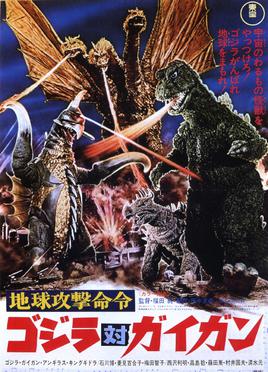
Godzilla vs. Gigan, is a 1972 Japanese kaiju film directed by Jun Fukuda, written by Shinichi Sekizawa, and produced by Tomoyuki Tanaka, with special effects by Teruyoshi Nakano. Distributed by Toho and produced under their effects-based subsidiary Toho-Eizo, it is the 12th film in the Godzilla franchise, and features the fictional monster characters Godzilla, Gigan, Anguirus, and King Ghidorah. The film stars Hiroshi Ishikawa, Yuriko Hishimi, Tomoko Umeda, and Minoru Takashima, alongside Haruo Nakajima as Godzilla, Kenpachiro Satsuma as Gigan, Koetsu Omiya as Anguirus, and Kanta Ina as King Ghidorah. It is the last film in which Godzilla was portrayed by Nakajima after playing the character since the original 1954 film; he subsequently retired from suit acting.
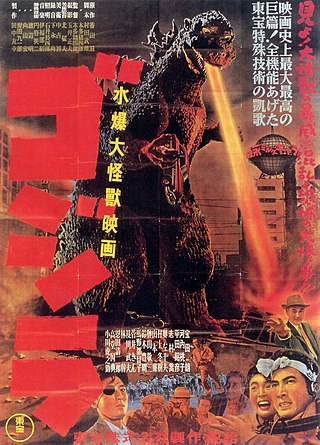
Tokusatsu is a Japanese term for live-action films or television programs that make heavy use of practical special effects. Credited to special effects director Eiji Tsuburaya, tokusatsu mainly refers to science fiction, war, fantasy, or horror media featuring such technology but is also occasionally dubbed a genre itself. Its contemporary use originated in the Japanese mass media around 1958 to explain special effects in an easy-to-understand manner and was popularized during the "first monster boom" (1966-1968). Prior to the monster boom, it was known in Japan as Tokushu gijutsu or shortened Tokugi.
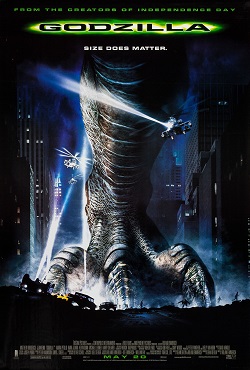
Godzilla is a 1998 American monster film directed and co-written by Roland Emmerich. Produced by Centropolis Entertainment, Fried Films, and Independent Pictures, and distributed by TriStar Pictures, it is a reboot of Toho Co., Ltd.'s Godzilla franchise. It is also the 23rd film in the franchise and the first Godzilla film to be completely produced by a Hollywood studio. The film stars Matthew Broderick, Jean Reno, Maria Pitillo, Hank Azaria, Kevin Dunn, Michael Lerner, and Harry Shearer. The film is dedicated to Tomoyuki Tanaka, the co-creator and producer of various Godzilla films, who died in April 1997. In the film, authorities investigate and battle a giant monster who migrates to New York City to nest its young.
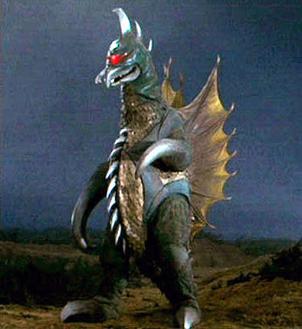
Gigan is a kaiju from Toho's Godzilla franchise who first appeared in Godzilla vs. Gigan. Gigan is a space monster resembling a species of reptile who was turned into a cyborg by the Nebulans. Gigan sports a huge buzzsaw in its frontal abdominal region and large metallic hooks for hands. Gigan is considered one of Godzilla's most brutal and violent opponents, and the first kaiju in the Toho sci-fi series to make him noticeably bleed. Complex listed the character as No. 2 on its "The 15 Most Badass Kaiju Monsters of All Time" list.

Hedorah, also known as the Smog Monster, is a kaiju monster who first appeared in Toho's 1971 film Godzilla vs. Hedorah. The huge monster was named for Hedoro (へどろ), the Japanese word for sludge, slime, vomit or chemical ooze.

Zilla is a fictional monster, or kaiju, in Toho Co., Ltd.'s Godzilla media franchise. The character first appeared in Godzilla (1998), released by TriStar Pictures. It was initially created as a reimagining of Godzilla but was later re-branded as a separate character. Patrick Tatopoulos designed it after iguanas with a slim theropod appearance rather than the thick, bipedal designs of Toho's Godzilla. TriStar's Godzilla, both the film and character, were negatively received by fans and critics. In 2004, it was featured in Toho's Godzilla: Final Wars as "Zilla". Afterwards, Toho trademarked new incarnations as Zilla, with only the iterations from the 1998 film and animated series retaining the Godzilla copyright and trademark.
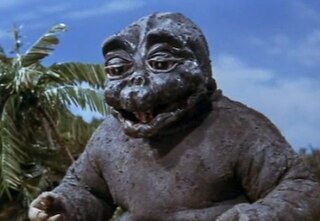
Minilla is a kaiju who first appeared in Toho's 1967 film Son of Godzilla. He is the adopted son of Godzilla, and is sometimes referenced as Minya, Godzilla Jr., and Baby Godzilla in the American dubbed versions.

Godzilla is a Japanese monster, or kaiju, media franchise consisting of films, television series, novels, comic books, video games, and other merchandise. The franchise is centered on the fictional kaiju Godzilla, a prehistoric reptilian monster awakened and powered by nuclear radiation. The franchise is recognized by the Guinness World Records as the "longest continuously running film franchise", having been in ongoing production since 1954, with several hiatuses of varying lengths. The film franchise consists of 38 films: 33 Japanese films produced and distributed by Toho Co., Ltd.; and five American films, the first of which was produced by TriStar Pictures and the remaining ones by Legendary Pictures, with the latest being set for release in March 2024.
As an enduring and iconic symbol of post-World War II cinematic history, the fictional giant monster Godzilla has been referenced and parodied numerous times in popular culture. Godzilla and other atomic monsters have appeared in a variety of mediums, including cartoons, film, literature, television, and video games.

Godzilla vs. Kong is a 2021 American monster film directed by Adam Wingard. Produced by Legendary Pictures and distributed by Warner Bros. Pictures, it is a sequel to Kong: Skull Island (2017) and Godzilla: King of the Monsters (2019), and is the fourth film in the MonsterVerse. It is also the 36th film in the Godzilla franchise, the 12th film in the King Kong franchise, and the fourth Godzilla film to be completely produced by an American film studio. The film stars Alexander Skarsgård, Millie Bobby Brown, Rebecca Hall, Brian Tyree Henry, Shun Oguri, Eiza González, Julian Dennison, Lance Reddick, Kyle Chandler, and Demián Bichir. Brown and Chandler reprise their roles from the previous Godzilla film. In the film, Kong clashes with Godzilla after humans move the ape from Skull Island to the Hollow Earth, homeworld of the monsters known as "Titans", to retrieve a power source for a secret weapon intended to stop Godzilla's mysterious attacks.

The MonsterVerse is an American multimedia franchise and shared universe featuring Godzilla, King Kong, and other characters owned and created by Toho Co., Ltd. The franchise consists of five films and two television series that have been produced by Legendary Pictures, with Warner Bros. Pictures distributing the films and the series being released for streaming on Netflix and Apple TV+. The franchise has received a generally positive critical reception and has grossed $1.955 billion worldwide at the box office.

Godzilla: King of the Monsters is a 2019 American monster film directed and co-written by Michael Dougherty. Produced by Legendary Pictures and distributed by Warner Bros. Pictures, it is a sequel to Godzilla (2014) and the third film in the MonsterVerse. It is also the 35th film in the Godzilla franchise, and the third Godzilla film to be completely produced by a Hollywood studio. The film stars Kyle Chandler, Vera Farmiga, Millie Bobby Brown, Bradley Whitford, Sally Hawkins, Charles Dance, Thomas Middleditch, Aisha Hinds, O'Shea Jackson Jr., David Strathairn, Ken Watanabe, and Zhang Ziyi. In the film, eco-terrorists release King Ghidorah, who awakens other monsters known as "Titans" across the world, forcing Godzilla and Mothra to surface and engage Ghidorah and Rodan in a decisive battle.
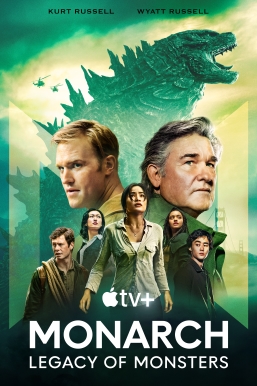
Monarch: Legacy of Monsters is an American monster television series created by Chris Black and Matt Fraction and produced by Legendary Television. Based on Godzilla by Toho Co., Ltd, it is the sixth installment and the second television series in the MonsterVerse franchise. Following the events of Godzilla (2014), the ten-episode series follows members of the Monarch organization as they encounter Godzilla and other monsters called Titans, across a half century.

Godzilla vs. Kong is the soundtrack to the 2021 American monster film Godzilla vs. Kong. A sequel to Kong: Skull Island (2017) and Godzilla: King of the Monsters (2019), it is the fourth film in Legendary's MonsterVerse, the 36th film in the Godzilla franchise, the 12th film in the King Kong franchise, and the fourth Godzilla film to be completely produced by a Hollywood studio. Directed by Adam Wingard, the film features musical score written and composed by Tom Holkenborg, the fourth film composer to work on the MonsterVerse franchise. He was announced as a part of the film in June 2020, before a planned meeting with Wingard, two years, expressing his interest on working on the score due to his personal love for the Godzilla film series during his teen years. The recording of the score took place for nearly two years, and was bundled into a soundtrack album, released by WaterTower Music in digital and physical formats on March 31, 2021, coinciding with the film's United States theatrical release.

Godzilla: King of the Monsters is the soundtrack to the 2019 American monster film Godzilla: King of the Monsters. A sequel to Godzilla (2014), it is the 35th film in the Godzilla franchise, the third film in Legendary's MonsterVerse, and the third Godzilla film to be completely produced by a Hollywood studio. Directed and co-written by Michael Dougherty, the film's musical score is composed by Bear McCreary, the third film composer to work on the MonsterVerse franchise. His involvement in the film was confirmed in July 2018, and recording of the musical score began later that year in Hong Kong. Several themes from Akira Ifukube's musical score for Godzilla (1954), were incorporated and sampled in the score. The album and score influenced a mix of electronic, trance and orchestral music with Japanese music for few of the themes. The soundtrack was released by WaterTower Music on May 24, 2019, a week before the film's theatrical release date. A limited edition triple LP soundtrack was released by Waxwork Records on July 5.

Godzilla: Original Motion Picture Soundtrack is the soundtrack to the 2014 American monster film Godzilla, which is a reboot of Toho's Godzilla franchise and also being the 30th film in that franchise. It is also the first film in Legendary's MonsterVerse and the second Godzilla film to be completely produced by a Hollywood studio. The score was composed and conducted by Alexandre Desplat, being the first film composer to work on the MonsterVerse franchise. The film score was released digitally by WaterTower Music on May 13, 2014, and a separate vinyl album was launched on June 17.



















